|
|
|
Sort Order |
|
|
|
Items / Page
|
|
|
|
|
|
|
| Srl | Item |
| 1 |
ID:
114998
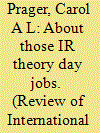

|
|
|
|
|
| Publication |
2011.
|
| Summary/Abstract |
Chris Brown's invitation in 'IR Theory in Britain - the New Black?' to consider whether theory's pre-eminence in British IR is warranted appears to have gone unheeded. He asks whether the consuming preoccupation with theory can be justified or will turn out to be as transitory as the 'new black' soon to be supplanted by the next 'new black'. There are many possible explanations for the neglect of Brown's views, but whatever the reason, epistemology can provide some answers. It draws attention to the applied aspect of IR theory as well as the nature of theory's relations with the rest of the discipline, buttressing Brown's arguments to this effect. I go further to ask whether theory's place is not ultimately best seen as one element in an approach not unlike classical redux.
|
|
|
|
|
|
|
|
|
|
|
|
|
|
|
|
| 2 |
ID:
101959
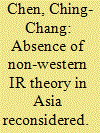

|
|
|
|
|
| Publication |
2011.
|
| Summary/Abstract |
This paper critically examines an ongoing debate in International Relations (IR) as to why there is apparently no non-Western IR theory in Asia and what should be done to 'mitigate' that situation. Its central contention is that simply calling for greater incorporation of ideas from the non-West and contributions by non-Western scholars from local 'vantage points' does not make IR more global or democratic, for that would do little to transform the discipline's Eurocentric epistemological foundations. Re-envisioning IR in Asia is not about discovering or producing as many 'indigenous' national schools of IR as possible, but about reorienting IR itself towards a post-Western era that does not reinforce the hegemony of the West within (and without) the discipline. Otherwise, even if local scholars could succeed in crafting a 'Chinese (or Indian, Japanese, Korean, etc.) School', it would be no more than constructing a 'derivative discourse' of Western modernist social science.
|
|
|
|
|
|
|
|
|
|
|
|
|
|
|
|
| 3 |
ID:
174551
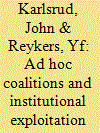

|
|
|
|
|
| Summary/Abstract |
While the increasingly thick web of global, regional and sub-regional security arrangements and institutions has received ample scholarly attention, the phenomenon of ad hoc military coalitions and how they impact these institutions has been relatively little explored. We examine ad hoc coalitions in international security responses and develop a tentative typology of military responses that takes ad hoc coalitions into consideration, where we differentiate in terms of institutionalisation and duration. Following a rational-choice institutionalist logic, we argue that institutional proliferation increases the chances of institutional exploitation. We illustrate this with how states apply a pick-and-choose approach in which institutional products but not frameworks are used. They use the interoperable forces, a common culture and mainstreamed doctrine, but not the formal deployment of rapid response mechanisms of eg the North Atlantic Treaty Organization and the African Union. In closing, we observe that institutional proliferation in international security facilitates a functionalist approach mainly inspired by national self-interest. Future research should examine whether this could result in dwindling relevance of international institutions, first in the domain of security, but later also in other domains.
|
|
|
|
|
|
|
|
|
|
|
|
|
|
|
|
| 4 |
ID:
137605
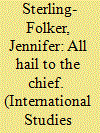

|
|
|
|
|
| Summary/Abstract |
Analytical pluralism in IR theory is a welcome development, yet it may also play a role in reifying our contemporary liberal world order. While there is clearly greater analytical diversity in the IR discipline today than in the latter half of the twentieth century, it is a diversity that is contained within the boundaries of acceptable liberal discourse. As a result, it does not constitute a challenge to dominant disciplinary ways of knowing and being. IR theory may enjoy a circumscribed version of analytical diversity in which multiple voices may speak but power does not listen. This possibility and its implications are considered, with particular attention paid to liberalism and positivism as the dominant analytical project of the contemporary moment.
|
|
|
|
|
|
|
|
|
|
|
|
|
|
|
|
| 5 |
ID:
163756
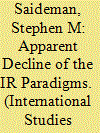

|
|
|
|
|
| Summary/Abstract |
Have the major international relations paradigms declined as much as has been asserted? Some scholars view paradigmatic theory and theory in general as on the decline as hypothesis-testing now apparently dominates published research. Such scholars argue that professionalization provides disincentives to theorize. This article demonstrates that these arguments are based on perceptions rather than on the data, on speculation about what professionalization incentivizes and how that influences research production. This article examines several datasets to consider these assertions. The article addresses what is being published, how scholars see themselves and the field, and what is being cited. Because scholars are publishing more articles compared to in the 1980s, the changes that some scholars have observed about the decline of certain approaches and the rise of others are relative and not absolute. A closer examination of the data reveals that what is perceived to be the normal pattern of theoretical output was an outlier in the mid-1990s and that pure theory development has always been a niche enterprise. To explain the trends, rather than stressing the impact of professionalization of the discipline, the article proposes an alternative process that focuses less on structure and more on agency. Social movements aimed to increase the publication of diverse theories and methodologies may have simply been effective: new journals are publishing more and more diverse articles, fostering a wider range of work. The article concludes by exploring the implications of the patterns of theory development in published IR research.
|
|
|
|
|
|
|
|
|
|
|
|
|
|
|
|
| 6 |
ID:
155291
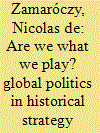

|
|
|
|
|
| Summary/Abstract |
Building upon current interest in studies of how popular culture relates to global politics, this article examines one hitherto overlooked aspect of popular culture: computer games. Although not prominent in the field of International Relations (IR), historical strategy computer games should be of particular interest to the discipline since they are explicitly designed to allow players to simulate global politics. This article highlights five major IR-related assumptions built into most single-player historical strategy games (the assumption of perfect information, the assumption of perfect control, the assumption of radical otherness, the assumption of perpetual conflict, and the assumption of environmental stasis) and contrasts them with IR scholarship about how these assumptions manifest themselves in the “real world.” This article concludes by making two arguments: first, we can use computer games as a mirror to critically reflect on the nature of contemporary global politics, and second, these games have important constitutive effects on understandings of global politics, effects that deserve to be examined empirically in a deeper manner.
|
|
|
|
|
|
|
|
|
|
|
|
|
|
|
|
| 7 |
ID:
152972
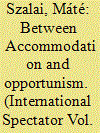

|
|
|
|
|
| Summary/Abstract |
Smaller members of the Gulf Cooperation Council defied theoretical and practical expectations as they were able to enlarge their international influence during the years of the Arab Spring. They adopted markedly different foreign policy strategies, which can be seen as stances lying between accommodation and opportunism, depending on the extent to which they respected the security concerns of their geopolitical patron, Saudi Arabia. The mainstream schools of IR theory – neorealism, neoliberalism and constructivism – offer different explanations for these phenomena. Although none of the three schools can provide a completely exhaustive explanation, neoliberalism seems to offer the most comprehensive framework for analysis.
|
|
|
|
|
|
|
|
|
|
|
|
|
|
|
|
| 8 |
ID:
165652
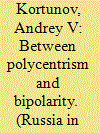

|
|
|
| 9 |
ID:
090145
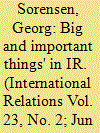

|
|
|
|
|
| Publication |
2009.
|
| Summary/Abstract |
Structural realism has important insights to offer regarding the current balance of power and its effects on world politics. But structural realism is less ready to analyze changes in statehood and their implications for international relations. States are not `like units' and anarchy does not always mean self-help. A richer concept of structure which includes economic power, political-military power, and international norms gives us a better take on the ways in which international forces affect domestic structures of states. In particular, they help us detect the weak states in the developing world, and the postmodern states in the OECD world. In weak states the classical security dilemma has been turned on its head: instead of domestic order and international threat there is domestic threat and international order. In postmodern states violent external threat has been dramatically reduced because these states make up a security community.
|
|
|
|
|
|
|
|
|
|
|
|
|
|
|
|
| 10 |
ID:
105932
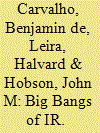

|
|
|
|
|
| Publication |
2011.
|
| Summary/Abstract |
International relations as we know them emerged through the peace of Westphalia, and the discipline of International Relations emerged in 1919 and developed through a First Great Debate between idealists and realists. These are the established myths of 1648 and 1919. In this article we demonstrate how historical and historiographical scholarship has demolished these myths, but that the myths regardless are pervasive in the current textbooks that are used in teaching future IR scholars. Disciplinary dialogue seems to have failed completely. Based on a detailed reading of the myths and their perpetuation, we discuss the consequences of the discipline's reliance on mythical origins, why there has been so little incorporation of revisionist insight and what possibilities there are for enhancing the dialogue.
|
|
|
|
|
|
|
|
|
|
|
|
|
|
|
|
| 11 |
ID:
087471
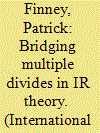

|
|
|
| 12 |
ID:
192196
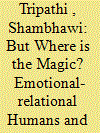

|
|
|
|
|
| Summary/Abstract |
The affective turn in International Relations (IR) has been engaged in the critical project of returning the emotional to the international for a while now. Following these efforts to reinvest humanity in politics, this article seeks to investigate if an engagement with emotional humans can provide refuge from, grapple with and ultimately transform a disenchanted world of IR and spell new worlds into existence that place the emotional-relational at the centre of its practice. Drawing on feminist, aesthetic and decolonial scholarship on emotional-relational humans, I argue that such imaginations can open routes to recovery for emotional worlds in the discipline. I introduce magical realist fiction as a genre of literary writing which embraces the magical ability of humans who resist and transform unbearably rational worlds through their emotional relations with each other. Gleaning moments of emotional incantations by humans–in Isabel Allende’s A Long Petal of the Sea, Salman Rushdie’s Midnight’s Children, and Gabriel Garcia Marquez’s Love in the Time of Cholera–which work to transform a world that becomes too difficult to bear for its inhabitants, I contend that IR stands to gain invaluable lessons by immersing itself in the kind of emotional magic that such literature and its resident humans spell into being.
|
|
|
|
|
|
|
|
|
|
|
|
|
|
|
|
| 13 |
ID:
144064
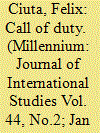

|
|
|
|
|
| Summary/Abstract |
This article attempts to further develop the IR research agenda on video games. The argument starts with a critique of the narrow focus on war-themed blockbuster games of current IR work on video games. I argue that this narrow view of IR and of video games is unsustainable and counterproductive, and has led to the positioning of IR as a regime of value with an unwarranted focus on the ideological effects of video games, and also to a paradoxical closing off of its research agenda. In the second half of the article I attempt to sketch two directions of research that could help overcome these initial limitations. The first outlines the potential for the IR study of the global aesthetic economy of video games, and the differentiated distribution of its regimes of value. The second encourages the study of game-worlds as practical-theoretical spaces where a particular relationship between academic subjectivity and its objects is constituted. The significance of this argument transcends IR video games research: it has relevance for cross-disciplinary issues regarding the status of academic moral-aesthetic judgements about cultural artfacts and practices; the relationship between academic and ‘popular’ knowledge; and the potential for political mobilisation at the interface of entertainment and social critique.
|
|
|
|
|
|
|
|
|
|
|
|
|
|
|
|
| 14 |
ID:
111633
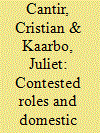

|
|
|
|
|
| Publication |
2012.
|
| Summary/Abstract |
Many of the strengths of research in Foreign Policy Analysis have been overlooked by role theorists. Role theorists often assume that roles are shared across elites and masses, that elites can manipulate masses, or that public opinion on roles constrains elites. Role theorists also tend to assume that there is a consensus among elites over national roles. Research in Foreign Policy Analysis, on the other hand, demonstrates that foreign policy may be contested both vertically (between elites and masses) and horizontally (among elites) and that these conflicts affect foreign policy decision making and foreign policy behavior. We propose that (i) contested roles mean that roles and foreign policy are not as stable as is often implied; (ii) research on contested roles offers Foreign Policy Analysis a less preference-oriented way of conceptualizing policy disagreements and decision making; and (iii) structures reveal themselves as important when agents use them in domestic discourse over contested roles, but the impact of international norm and role structures is not automatic, as it is shaped by the agents (and domestic structures) in the domestic political process. We suggest that research on the strategic use of roles could bring together these benefits of examining contested roles.
|
|
|
|
|
|
|
|
|
|
|
|
|
|
|
|
| 15 |
ID:
160620
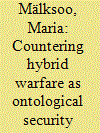

|
|
|
|
|
| Summary/Abstract |
What are the ethical pitfalls of countering hybrid warfare? This article proposes an ontological security-inspired reading of the EU and NATO’s engagement with hybrid threats. It illustrates how hybrid threat management collapses their daily security struggles into ontological security management exercise. This has major consequences for defining the threshold of an Article 5 attack and the related response for NATO, and the maintenance of a particular symbolic order and identity narrative for the EU. The institutionalisation of hybrid threat counteraction emerges as a routinisation strategy to cope with the “known unknowns”. Fostering resilience points at the problematic prospect of compromising the fuzzy distinction between politics and war: the logic of hybrid conflicts presumes that all politics could be reduced to a potential build-up phase for a full-blown confrontation. Efficient hybrid threat management faces the central paradox of militant democracy whereby the very attempt to defend democracy might harm it.
|
|
|
|
|
|
|
|
|
|
|
|
|
|
|
|
| 16 |
ID:
110912
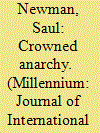

|
|
|
|
|
| Publication |
2012.
|
| Summary/Abstract |
In this article I will explore the paradoxical relationship between anarchism and realism in International Relations (IR) theory. I will do this in an oblique way by uncovering an uncomfortable complicity shared by that existentialist and heretical realist, Carl Schmitt, with his ideological arch-enemies the anarchists. In their diametrically opposed positions on the state, both Schmitt and the anarchists reveal the absolutism of the state in the sovereign moment of exception, and its reliance on a figure of anarchy which at the same time destabilises it, blurring the division between inside and outside and opening up a genuinely revolutionary moment. Here the notion of anarchy is used to deconstruct realism, while at the same time suggesting a move beyond anarchism itself towards a post-foundationalist anarchism or 'postanarchism'. Anarchy reveals the contingency and inconsistency of hegemonic identities in IR, as well as the autonomy of the political which is vital to understanding contemporary movements of resistance to statism and capitalism.
|
|
|
|
|
|
|
|
|
|
|
|
|
|
|
|
| 17 |
ID:
137601
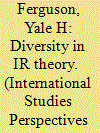

|
|
|
|
|
| Summary/Abstract |
Rather than dead or even moribund, International Relations (IR) theory is most certainly “alive,” although of course exactly how “well” remains a matter for debate. This article explains that each of the traditional and more recent “schools” of theory has its important strengths and serious weaknesses. Some theories are more appropriately applied to particular problems than to others. Analysts need to be conversant with a wide range of theories so they can recognize them when they are being employed (even only implicitly) and also use them as a toolkit when developing a research subject or explanations for patterns observed. Viewing some subjects simultaneously from more than one theoretical perspective often enhances understanding.
|
|
|
|
|
|
|
|
|
|
|
|
|
|
|
|
| 18 |
ID:
118100
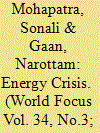

|
|
|
| 19 |
ID:
101473
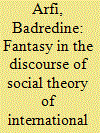

|
|
|
|
|
| Publication |
2010.
|
| Summary/Abstract |
No doubt Wendt's 'Social Theory of International Politics' (STIP) is a discourse. As such, the theory is built on certain discursive conditions of possibility. Drawing on Lacan's theory of discourse, I analyse these conditions of possibility in arguing that a desire of discursive closure is created in STIP through a fantasy. The latter sustains itself not only by pre-empting its own failure but also by maintaining the desire for discursive closure. I argue that STIP cannot escape deploying such a fantasy. More broadly, what social constructivism based on critical realism does, especially in its thin version, is construct a dichotomy between intransitive and transitive objects in its theoretic discourses. It then endeavours, via constructing fantasies, to use transitive discursive objects to sustain the desire for the constructed dichotomies, which hankers for discursive closure. This means that Wendt is more constructivist than he knows, despite his move of 'not going all the way down'. In short, I argue that 'ideas not all the way down' is a discourse all the way down because of what Wendt and thin constructivists struggle to make of it.
|
|
|
|
|
|
|
|
|
|
|
|
|
|
|
|
| 20 |
ID:
179479
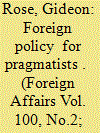

|
|
|
|
|
| Summary/Abstract |
Bismarck once said that the statesman’stask was to hear God’s footsteps marching through
history and try to catch his coattails as he went past. U.S. President GeorgeW.
Bush agreed.
|
|
|
|
|
|
|
|
|
|
|
|
|
|
|
|
|
|
|
|
|